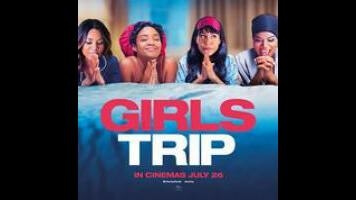Girls Trip mixes raunch, empowerment, and squishy sentiment

A lot of raunchy R-rated comedies get knocked for belatedly introducing an element of sentiment, lesson learning, or other soft-heartedness in the final stretch. So give Girls Trip some credit for getting sentimental right up front, where everyone can see. Before the opening credits have finished rolling, voice-over narration is lamenting the distance that can grow between even the tightest of friendships and hyping up the audience for a reunion of characters who have barely been introduced. It may be shameless, but it’s honest.
Like the quartet of diverging college pals recently reunited for Rough Night, the ladies of Girls Trip have achieved varying levels of professional and/or romantic success in their years apart. Ryan (Regina Hall) is the polished, poised, and in-demand author of a series of books, the latest of which begs for some kind of karmic punishment with the title You Can Have It All. Sasha (Queen Latifah), once a promising journalism student, now runs a flailing gossip blog following the years-ago dissolution of a potential business with Ryan. Lisa (Jada Pinkett Smith) is a rule-following mom still recovering from her divorce, while Dina (Tiffany Haddish) is unphased by any such setbacks—in her first big scene, she blithely ignores the HR rep attempting to fire her from her indistinct office job.
Together, the women call themselves the Flossy Posse, and reunite for Ryan’s trip to New Orleans to promote her book alongside her picture-perfect husband, Stewart (Mike Colter—Luke Cage himself!), at the Essence Festival. Girls Trip itself represents a number of movie-set reunions: Latifah and Pinkett Smith co-starred in Set It Off, which gets a winking shout-out here; director Malcolm D. Lee and screenwriters Kenya Barris (Black-ish) and Tracy Oliver made Barbershop: The Next Cut with Hall, who has appeared in several of Lee’s other films (including the recent and reunion-centric sequel The Best Man Holiday); and Barbershop spin-off Beauty Shop featured Latifah. Whether it’s through actual offscreen familiarity or just an overflow of charm, the four women create a believable group dynamic out of thin writing, though Haddish stands apart by gleefully nabbing scenes and laughs from her more famous co-stars.
The movie places the women at Essence Fest for a mix of drunken shenanigans and empowerment, which means set pieces predicated on oral sex tutorials or spraying urine bump up awkwardly against starstruck footage of Ava DuVernay, Terry McMillan, Morris Chestnut, and an impressive array of musicians (including Common, Maxwell, Faith Evans, Ne-Yo, and Estelle, among others). Lee proves he can goose outrageousness at least as well as the Farrelly brothers or Todd Phillips, and it’s fun to see a little more freedom from producer Will Packer, whose other projects often obsess over courtship and domestication. But many of the biggest laughs are more casual, in little dialogue digs or smaller moments, like the way Dina explains that she’s not going to start any trouble as she calmly removes her earrings, clearly preparing for a confrontation. Lee has a better handle on this smaller-scale material; a late-movie dance-off scene isn’t cut together for the intended maximum delight.
Some of the bigger stuff does work—Latifah has a spectacularly silly absinthe-fueled moment where she makes out with a lamp—but the movie could use more scenes where its characters just get to talk to each other, snipe at each other, and revel in their shared history. Girls Trip is more inclined to use the quieter moments for its belabored dramatic side, as problems in Ryan’s marriage become more visible to the rest of the Flossy Posse. There isn’t much suspense about Stewart’s honor, because the men of Girls Trip come in two basic varieties: blandly handsome cads and blandly handsome gentlemen. The movie needs them, though, because alongside its marital drama, Girls Trip still wants to sell some aspirational fantasy; Ryan may be conflicted over her husband, but her seemingly vast personal wealth never appears threatened. After parodying her immaculately manufactured notion of having it all, the movie refuses to puncture it outright. The script more or less turns around and says she just needed a slightly different configuration of “all” than she thought—gentleman instead of cad, plus more time with the girls. This is all ultimately portrayed as an easy (and enriching) fix, backed up by a climactic festival speech so long, unfunny, and empty that it feels like Ryan is about to announce her candidacy for office.
Some celebration is still in order. This is the rare mainstream movie to boast black women in four unequivocal leading roles, in a summer where diversity in comedy skews more toward knocking off Bridesmaids with slightly younger white people. Girls Trip functions as a belated rite of passage for Hall, Latifah, Smith, and Haddish: Like so many movie stars before them, they’re placed front and center for a big crowd-pleasing comedy that’s a little too long, squishy, and sloppy for its own good.